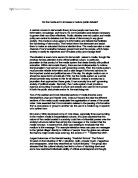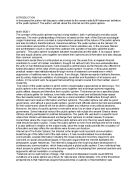Rupert Murdoch Vs BBC: Is the battle between private sector and public Sector media a threat to UK democracy?
Essay Title: Rupert Murdoch Vs BBC: Is the battle between private sector and public Sector media a threat to UK democracy?
Rupert Murdoch Vs BBC: Is the battle between private sector and public Sector media a threat to UK democracy?
Prime Ministers, Politicians and the Government are all faced today by a concentration of media owners. With fewer businesses now controlling the mass media the diversity of debate is narrowed with an increased control over the politics being written. The affects of a shrinking media ownership have given way to a possible new Marxist or critical theory.
Rupert Murdoch is one of the most famous capitalists in the media industry. He owns Sky News and controls the Sun and the Times newspapers. In the UK alone, Rupert Murdoch owns almost 35% of distributed newspapers. He has impacted the media industry in a tremendous way and his corporation has gone from being a successful business to a thriving enterprise by entering the prominent media stations and countries. However he makes no attempts to cover up his own agenda. He openly makes statements such as, “For better or for worse, our company …is a reflection of my thinking, my character, my values.”1 His views are consistent with those cited in Noam Chomsky’s pamphlet ‘Media control: the spectacular achievements of propaganda.’2 He states that we exist in a spectator democracy, which is regulated by an elite group to create a different version of reality as a result of manipulating the media. Although newspapers in the UK are significant, television is particularly important to politicians, often more so than newspapers. Even a mere two minutes of exposure during peak times can enable politicians to address larger populations than they could ever reach in a lifetime of canvassing public meetings.3 The BBC is well regarded for their news coverage during a crisis, which is usually the time politicians, are desperately wanting to air their views. For example during the Iraq war viewers turned “to the BBC as a source of news in overwhelming numbers.”4 With the BBC dominating the world of news in the UK it is no surprise that Murdoch wants to use his power to shift the BBC into a niche “quality” market, catering only for the minority middle class interests.
It is for these reasons that I base the discussion of democracy on the hostile relationship between these two media corporations. The question of this paper asks whether, the battle between the private sector (Murdoch) and public Sector (BBC) media corporations is a threat to UK democracy? In order to answer this, the paper will be split into two main discussion areas. The first section will examine the amount of power Murdoch exerts over the UK Government and how this control has threatened the BBC. The second part focuses on whether his threat to remove the BBC could transcend into a threat on UK democracy? In order to analyse what impact the removal of the BBC would have on UK democracy, the reliability of the corporation must be tested. This will be done using The Propaganda Model developed by Edward S. Herman and Noam Chomsky. A final analysis of what impact the media has on its audience will be briefly examined in order to come to a logical conclusion. Throughout the essay references will be made to key theories and models in order to provoke critical thinking.
We first begin by examining the amount of power Murdoch exerts over the UK Government. The book ‘Power without Responsibility’ states that “The media do have some political autonomy.”5 In the case of Murdoch this statement could not be truer, for example “Murdoch wields considerable power…and is often wooed by politicians to persuade him to favourably cover their campaigns.”6 The partnership between Tony Blair and Rupert Murdoch began in 1995 when seemingly Tony Blair did a deal with Murdoch in return for switching his papers to support the Labour Party overnight. However the question over political autonomy goes back over a much longer time period. In 1992 the Sun's headline “It's the sun wot won it for John Major”7 brought the question of press bias to a head. The view that the media were able to change the voting minds of the public is supported by the hypodermic model, which claims that those who control the media control the hearts and minds of the public through the propaganda they disperse. At the same time it challenges the views of Blumler and McQuail (1968) that claim people do not react directly to political media messages.8 Although nowadays Blumer and McQuail’s theory would probably carry more weight as the public are increasingly being educated on the extent and effects of propaganda.
However Murdoch’s power over the government extends beyond just election time. His papers continuously manipulate stories to increase the popularity of the Government. He does this in return for favourable Government policies, which allow his enterprise to grow and dominate all other media stations such as the BBC. For example in 2003 the Communications Act was passed reforming the rules on media ownership to promote competition and investment. The Act has opened up the market for business tycoons like Rupert Murdoch to buy broadcasters such as Five, thus increasing his dominance in the broadcasting industry. So how exactly does Murdoch manipulate stories to suit the government in return for these favourable policies? Well the following are just a couple of current examples taken from a large selection. Firstly during the week commencing August 18th 2003, “The Sun” newspaper began an ongoing series of articles on asylum-seekers. It stated that “the problem of asylum-seekers is out of control” and Tony Blair must “stem the flood of people entering Britain illegally.”9 At this point ask yourself why ‘The Sun’ would launch an attack against its closest associate? Well it’s been suggested that the timing of the campaign was off crucial significance. It is no secret that ‘The Sun’ has always supported Tony Blair on the Iraq war and in return Blair’s first interview at the end of the war was with Trevor Kavanagh who is ‘The Sun’s’ political editor. However, although Blair and Murdoch tried to justify the case for war, prospects of Labour winning the next election were doubtful. In an attempt for Labour to gain control once again, some believed Murdoch used his paper to divert attention away from the war and set up the ‘anti-immigrant campaign’. He proclaimed that the Labour Party should be convicted for neglecting to combat asylum-seekers and this should be the basis of whether they serve another term in parliament (not the Iraq war). An article taken from the ‘The Mail Online’ further emphasises this claim. It states that “Downing Street knew all about the campaign well in advance…Three days later, bang on cue, the Home Secretary came to the rescue.”10 The second example also demonstrates Murdoch’s close relationship with the Government, as well as highlighting how his control over the Labour Party has threatened the BBC’s existence. We look at how Murdoch’s papers supported the government in the battle with the BBC over the contents of the “weapons of mass destruction” dossier. Murdoch attacked the BBC in an almost uniformed pattern from the Sun, to the Times, to the News of the World. He wanted to tarnish the objectivity of the BBC – the very perception that pulls in so many viewers. He therefore set out a campaign to portray BBC as anti war and anti Government. The Government could not have asked for better support and Murdoch could not have asked for better timing! The communications bill was just around the corner and therefore a prime opportunity for Murdoch to enter into terrestrial British TV. In return for Murdoch’s support he knew that the passing of the communications Act would be inevitable, paving the way to his entry. In addition to this Murdoch knew that by placing the BBC in the worst possible light he would help threaten its funding from licence fees. The BBC is dependent on these fees and any threat to them will prevent them from continuing in their present form. The timing could therefore not have been any better as far as Murdoch was concerned, because in 2006 the Royal Charter, under which the BBC operates, expires. “The scale of its activities…and the way it is…funded are being questioned as never before.”11 Murdoch therefore acted like any other MNC and capitalised on his biggest asset, his relationship with the Government, to destroy his competitor, the BBC. The reality of Murdoch achieving his goal seems all but too real; especially now the date of the Royal Charter seems a short distance away. So if Murdoch were successful in his mission, to shift the BBC into a minority-viewing sector, what affect would this have on the UK’s viewing public? Well the only way this can be answered is to measure the popularity and reliability of the BBC, which we now move onto look at in detail.







